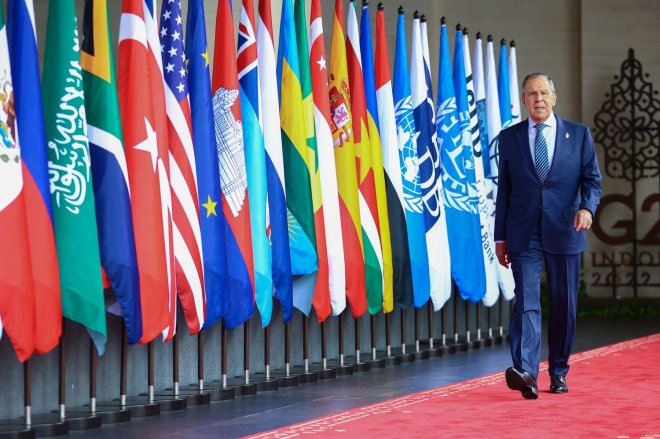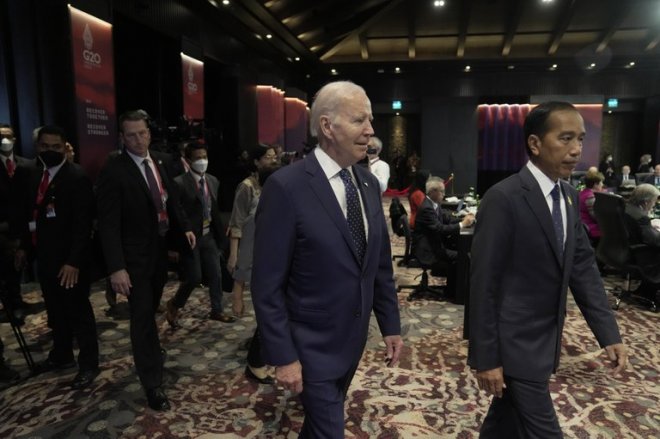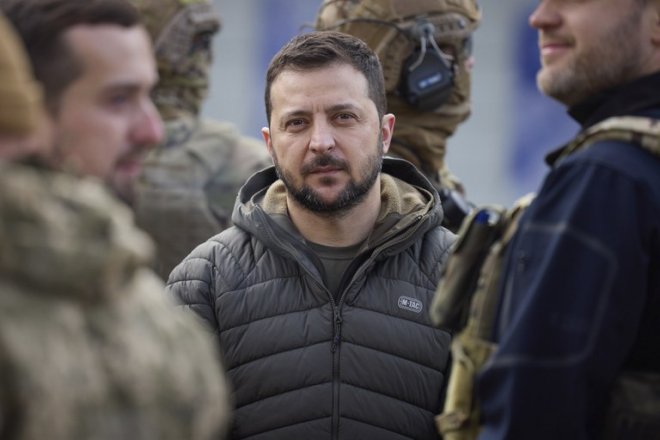
Most of the leaders of the Group of 20 meeting in Indonesia are expected to strongly condemn the war in Ukraine in a summit declaration, according to a draft obtained by BenarNews.
Russia’s invasion of Ukraine looms large over the two-day meeting, which began on the Indonesian island of Bali on Tuesday. The conflict that has now dragged into its ninth month has put heavy pressure on the world’s economy and led to soaring energy and food prices.
The war in Ukraine has also caused division among members of the G-20 – the world’s 20 largest economies – with countries like the U.S., the U.K. and other Western powers strongly criticizing Russia, and others, such as India, Saudi Arabia and China, refraining from doing so.
But summit attendees appeared to be coalescing around the declaration, a draft of which states: “Most members strongly condemned the war in Ukraine and stressed it is causing immense human suffering and exacerbating existing fragilities in the global economy.”
The draft, which has yet to be signed, acknowledges different views among the G-20, noting that, “There were other views and different assessments of the situation and sanctions.” The content of the draft, seen by BenarNews, a news organization affiliated with RFA, was confirmed by a European diplomat who briefed reporters on condition of anonymity because of the sensitivity of the matter.
But it remained unclear whether Russia would agree to the wording. While U.S. President Joe Biden and Chinese President Xi Jinping are in Bali, Russian President Vladimir Putin is not, and is represented instead by his top diplomat Sergey Lavrov.
Lavrov was due to address a news conference later Tuesday. In a video distributed by his ministry on Monday, he said: "We will adopt the final declaration tomorrow.” But he explained that negotiations on the final document were ongoing.
 U.S. President Joe Biden, left, walks with Indonesia President Joko Widodo during the G-20 leaders summit in Nusa Dua, Bali, Indonesia, Tuesday, Nov. 15, 2022. (AP Photo/Dita Alangkara, Pool)As the summit kicked off, the host, Indonesian President Joko Widodo, urged leaders to bridge “very deep, very wide differences.”
U.S. President Joe Biden, left, walks with Indonesia President Joko Widodo during the G-20 leaders summit in Nusa Dua, Bali, Indonesia, Tuesday, Nov. 15, 2022. (AP Photo/Dita Alangkara, Pool)As the summit kicked off, the host, Indonesian President Joko Widodo, urged leaders to bridge “very deep, very wide differences.”
“We have no other options. Paradigm of collaboration is badly needed to save the world,” he said.
The Indonesian president said that as leaders of the grouping that accounts for more than 60 percent of the world’s population, “we all have responsibility.”
“Being responsible here also means that we must end the war,” said Widodo, popularly known as Jokowi, adding that the leaders “must not allow the world to fall into another Cold War.”
Zelenskyy’s address
Charles Michel, the EU Council’s president, said concerns over the war, economic recovery and major power rivalry, made the summit “one of the most difficult ones that there have ever been.”
Ukrainian President Volodymyr Zelenskyy was invited by Jokowi to join the summit despite Ukraine not being a G-20 member.
Wearing his familiar army-green T-shirt, Zelenskyy addressed the gathering in Ukrainian language via video link for about 20 minutes. Lavrov was among those listening.
The president used the term “G-19,” apparently excluding Russia, three times during his address.
Zelenskyy presented “a set of solutions that need to be implemented,” including safeguarding nuclear facilities and the extension of a U.N.- and Turkey-brokered grain deal that expires in a few days to enable food exports from Ukraine, which is a major global food supplier. He also called for the release of all prisoners and deported persons.
“No one has the right to blackmail the world with a radioactive disaster,” he told the summit, urging: “Please use all your power to make Russia abandon nuclear threats.”
 In this photo provided by the Ukrainian Presidential Press Office and posted on Facebook, Ukrainian President Volodymyr Zelenskyy seen during his visit to Kherson, Ukraine, Monday, Nov. 14, 2022. (Ukrainian Presidential Press Office via AP, File)Ukraine"s nuclear power plant at Zaporizhzhia – the largest in Europe – has been occupied by Russian forces since March and damaged by Russian shelling. Ukrainian workers there are essentially being held captive.
In this photo provided by the Ukrainian Presidential Press Office and posted on Facebook, Ukrainian President Volodymyr Zelenskyy seen during his visit to Kherson, Ukraine, Monday, Nov. 14, 2022. (Ukrainian Presidential Press Office via AP, File)Ukraine"s nuclear power plant at Zaporizhzhia – the largest in Europe – has been occupied by Russian forces since March and damaged by Russian shelling. Ukrainian workers there are essentially being held captive.
The implementation of his proposals “will save thousands of lives,” Zelenskyy said.
“It will restore the validity of international law,” he said. “It will return the global stability.”
Zelenskyy’s proposals “hopefully will help persuade countries which are still sitting on the fence,” said Yurii Poita, a political analyst at the Kyiv-based think-tank New Geopolitics Research Network.
India, China, Brazil and Saudi Arabia have not outright condemned the Russian invasion of Ukraine, to date.
“The Ukrainian leadership is thankful for the U.S.’s diplomatic efforts on behalf of Ukraine but I don’t think Ukraine expects too much from the summit,” said Poita.
“They are trying to use every opportunity to better other countries’ understanding of the war.”
“Zelenskyy wants to explain that to support Ukraine is to be on the right side of history,” the analyst said.
Xi-Biden meeting shows positive sign
The Russian foreign minister is scheduled to hold a press conference on the sidelines of the summit on Tuesday afternoon, where he’s expected to present Moscow’s viewpoint.
Lavrov had a meeting with his Chinese counterpart Wang Yi on Tuesday, according to the Russian Foreign Ministry. During the meeting, Wang told Lavrov that China opposed calls to exclude Russia from the G-20 and other international forums, RIA Novosti reported.
Lavrov also welcomed Xi"s reelection as the head of China"s Communist Party and hoped for continuity in its approaches to cooperation with Russia, RIA Novosti said.
There’s no publicly announced plan for a “family photo” of G-20 leaders, apparently to avoid potential uneasiness over the presence of the Russian representative.
Analysts say, however, that a fence-building meeting between Xi and Biden in Bali on Monday hinted at China’s opposition to the threat of a nuclear war from Russia.
“President Biden and President Xi reiterated their agreement that a nuclear war should never be fought and can never be won and underscored their opposition to the use or threat of use of nuclear weapons in Ukraine,” the White House said after the meeting between the two leaders.
Beijing is an ally of Moscow and has so far insisted on “neutrality” towards the war in Ukraine.
“While this particular line did not appear on the official Chinese readout, the fact that the White House readout clearly noted that both leaders affirmed this statement was significant and a critical communication of redlines to Putin,” said Patricia Kim of the John L. Thornton China Center and the Center for East Asia Policy Studies at the Brookings Institution.
